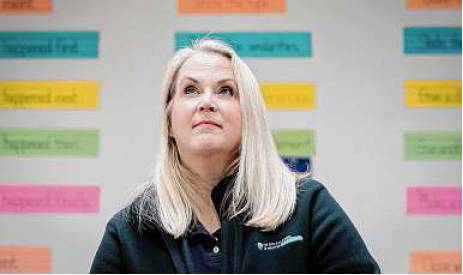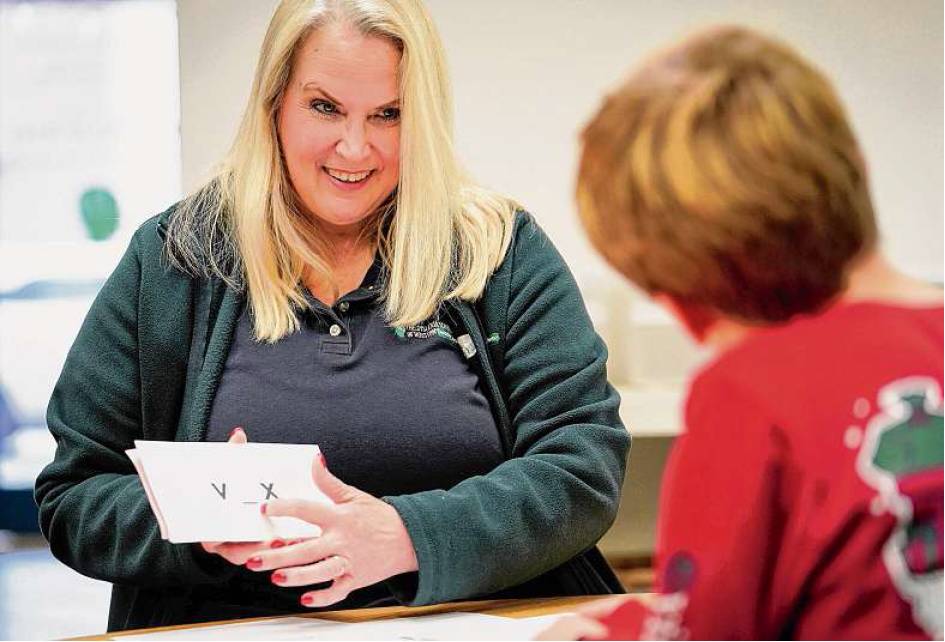School helps children struggling to read
Dyslexia instruction program began from founder’s own garage
By Anna Bauman STAFF WRITER
Madison Peddle had trouble reading in early childhood, and by the time she reached fourth grade, it was causing even bigger problems.
Her father watched with heartbreak as his little girl, who was diagnosed with dyslexia, erupted in outbursts after school, failed to finish homework and lost her sunny spirit.
“We were at a point where we were falling apart,” said Paul Peddle, a West University Place resident.
Madison was fed up, too, and one day nearly three months ago, she walked down the street from her elementary school to a building with a white awning and a woman on a mission to support students just like her.
“I really need your help,” the girl declared to Tammy Spencer at the Dyslexia School of Houston.
Madison is now among dozens of students attending classes at the school, which offers screening, assessment and specialized in-person instruction for students with dyslexia, a common learning disability characterized by difficulty reading.
Peddle said he has been amazed by the growth in his daughter, especially her confidence and emotional well-being.
“It was not even a week, and she just bloomed,” he said. “There’s something special about Tammy and what she’s doing.”
Spencer launched the dyslexia school more than two years ago as classrooms closed and schools turned to online instruction during the pandemic, exacerbating challenges for many students with learning disabilities.
As parents and teachers told her about their desperation, the former public school educator had an idea. She wanted to open an in-person school for kids with dyslexia, and she would do it from her own garage.
“I took the leap of faith, I took the risk, and I said, ‘I’m going to do what I know is best, and that’s teach children,’ ” she said.
Dyslexia is a neurological condition that has no relationship to a person’s intelligence, according to the International Dyslexia Association.
There is no cure for the condition, but most people can successfully learn to read with the right instruction and coping strategies, according to the association.
As an educator-turned-entrepreneur, Spencer transformed the apartment above her detached garage from a bedroom to a classroom with white boards, folding tables and card-table chairs where kids from across the metro area sat down to learn.
Among the first group of students was a first grader from Katy.
Kanisha Aikin had been worried about her son Carter’s reading ability, but she said her concerns were not well received at his school. His first grade teacher chalked it up to behavior and attention issues. Aikin knew it was something deeper.
She had searched hopelessly for resources that would be right for her son, and eventually, saw a post about Spencer’s new school on Facebook.
The mother immediately called Spencer. The pair talked for more than an hour. Soon, Aikin was arranging a carpool with other parents in Katy to get their kids to Houston every day.
“It completely changed everything for him,” she said about her the school’s impact on her son. “Not only did he learn to read, and did he learn to advocate for himself, but his confidence blossomed.”
Now, Carter is thriving as a fourth grader at King Elementary in Katy. He is reading on grade level and his teachers are singing his praises, especially about the responsible and smart way he uses the accommodations for his learning disability.
“(Spencer) just gave them so much confidence in dyslexia as a superpower and not as a disability,” his mother said.
The dyslexia school has since moved to a nearby building in West University Place and enrollment has climbed to more than 50 students. The school offers before- and after-school sessions for school-aged children meant to supplement their education. It instructs kids ages 4 to 15, according to Spencer.
Spencer spent her decades-long career in public education, most recently as an administrator overseeing dyslexia services at Houston ISD.
The public education system is “broken” and students with dyslexia and other learning disabilities typically do not get the help they need, Spencer said.
“I no longer want to be part of a problem. I want to be the solution,” she said. “This is not brand new, and yet we’re running around acting like it is.”
The stakes are high. People with dyslexia who do not get a diagnosis or treatment may never become literate, Spencer said. They may struggle with social and emotional issues like anger and frustration, as well as longterm challenges in academics and jobs.
“Reading is everything,” Spencer said. “If you can’t read, how do you go to the next level from high school? If you can’t fill out an application, how do you get a job?”
Spencer said she hopes to expand beyond the West University Place location and reach more students who cannot afford the program. by offering additional scholarships or supports. She has also launched a nonprofit called The Code Academy that helps some students attend the tuition-based dyslexia school, which costs parents $1,500 per month.
“Now, I’m only able to reach the ones that can afford this,” she said. “What keeps me up at night are the ones that don’t make it to me.”
While the school focuses on prevention among young children, trained teachers also provide intervention services, especially for older students who have fallen through the cracks.
“We have so many children in middle school that are illiterate or very, very poor readers because they were part of this broken system,” she said. “They just kept getting passed along.”
Peddle said his daughter was receiving “negligible” services for dyslexia at her public school, and there were few other resources.
Madison has made progress in reading and school over the last few months, and she told her parents she wants to become an entrepreneur one day.
She recently ran for student council, campaigning on the promise that she would support fellow students with dyslexia.
“She’s very confident in saying, ‘I have dyslexia, and there’s times I need help,’ ” her father said. “It’s unreal, the change and the growth.” anna.bauman@chron.com

